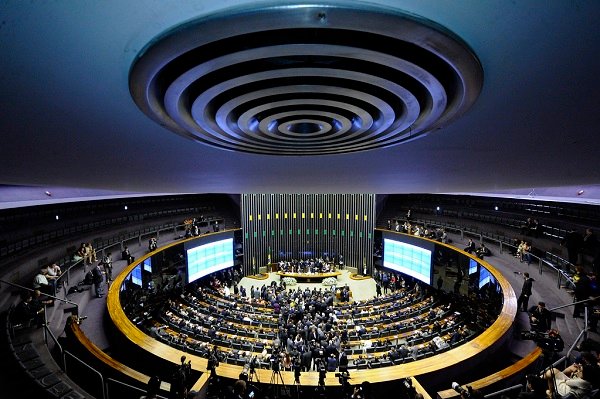The Brazilian political and economic landscape is marked by simultaneous pressures in Congress and the Executive branch. On one side, the centrão is pushing new measures to shield parliamentarians, while Jair Bolsonaro’s allies continue to press for a broad amnesty for those involved in the January 8th anti-democratic acts – a demand rejected by Chamber Speaker Hugo Motta. From house arrest, Bolsonaro has urged patience from his party, discouraging direct clashes with Motta. Meanwhile, the federation between União Brasil and PP is redefining partisan alignments with the Lula administration, although without immediately withdrawing its ministers. On the economic front, President Lula’s government has unveiled a relief package to counter the impact of steep U.S. tariffs, combining subsidized credit, tax deferrals, and public procurement to support affected exporters.
This Content Is Only For Subscribers
To unlock this content, subscribe to INTERLIRA Reports.
General Amnesty
The Speaker of the Chamber of Deputies, Hugo Motta (Republicans), stated on Thursday (14/08) that there is no political environment within Congress for a “broad, general, and unrestricted” amnesty, as demanded by supporters of former President Jair Bolsonaro (PL). Last week, Bolsonaro’s allies occupied the Chamber and Senate floors in an attempt to push through a package of measures, including an amnesty for all those involved in the anti-democratic acts of January 8th. According to Motta, an alternative bill could generate a “better environment” between opposition and pro-government parties.
Patience
From house arrest, Jair Bolsonaro has been advising members of his party, the PL, on how to navigate the unfolding crisis in Congress. To interlocutors who visited him in Brasília, he praised the recent attempt to obstruct the voting agenda as a positive initiative, although he admitted there were flaws in its execution. Bolsonaro urged PL lawmakers to remain patient with the Speaker of the House and avoid escalating the confrontation with Motta, arguing that time is needed for the bloc’s demands—such as approval of the amnesty bill for those involved in the January 8th coup, which would also benefit him—to advance.
Shielding Parliamentarians
The centrão’s new push to expand protections for parliamentarians continues a long history of legislative changes designed to soften white-collar crime laws, a trend seen since 2016, when the group also blocked proposals aimed at tightening accountability. While past moves were largely in response to Operation Car Wash, the bloc—now holding majorities in both the House and Senate—is targeting parliamentary amendments. An agreement reached between former Chamber Speaker Arthur Lira (PP) and Bolsonaro’s allies foresees ending the Supreme Federal Court’s exclusive jurisdiction over members of Congress and reinstating the requirement for prior legislative authorization before lawmakers can be criminally prosecuted—a privilege abolished by Congress in 2001.
New Federation
On Tuesday (19/08), União Brasil and PP will formalize the federation expected to approve, by year’s end, a directive for the parties’ withdrawal from the Lula administration, although with exceptions allowing ministers to temporarily remain in office in a “personal” capacity. This arrangement will protect four current ministers—Celso Sabino (Tourism), Waldez Góes (Regional Integration), and Frederico de Siqueira (Communications) from União, and André Fufuca (Sports) from PP—from punishment. The consensus is that forcing their immediate exit would create unnecessary political strain, especially since they are set to step down in April next year to run in the elections. Furthermore, their electoral projects still depend heavily on Lula’s support.
Business Relief
On Wednesday (13/08), the Lula administration (PT) announced a relief package for companies affected by the 50% tariff hike imposed by the United States. The program provides a series of tools to support exporters, ranging from subsidized credit to public procurement, and is detailed in a provisional measure (MP) already in force. Congress must evaluate the MP within 120 days. The package includes:
- Credit Lines: R$30 billion from the Export Guarantee Fund (FGE) for credit operations, ensuring affordable rates.
- Extension of Drawback Deadlines: Exceptional extensions for proving exports of products made with imported or tax-suspended domestic inputs.
- Deferral of Federal Taxes: Authorization for the Federal Revenue Service to postpone tax collections for companies most affected by the tariff hike.
- Public Procurement: Extraordinary purchases by federal, state, and municipal governments for food programs (schools, hospitals, etc.), carried out through simplified procedures at market-average prices. This measure applies exclusively to products impacted by unilateral U.S. surcharges.
Analysis:
The current Brazilian political and economic scenario illustrates how pressures on different institutional fronts converge, producing both instability and attempts at accommodation. On the political side, Congress finds itself navigating competing agendas: the centrão’s initiative to strengthen protections for parliamentarians, Bolsonaro’s camp pushing for an amnesty tied to January 8th, and Speaker Hugo Motta’s resistance to such a move. These dynamics demonstrate how institutional rules, especially those governing accountability, remain highly contested and subject to negotiation depending on the balance of power. Motta’s rejection of a sweeping amnesty does not close the debate; instead, it signals an effort to contain immediate radicalism while leaving room for alternative formulas that could partially address the opposition’s demands.
Bolsonaro’s position, even under house arrest, continues to shape the PL’s strategy. His guidance for patience reflects a pragmatic calculation: confrontation with the Chamber’s leadership risks isolating his bloc, while gradual pressure may yield concessions in the medium term.
The centrão’s renewed push for shielding parliamentarians must be seen in continuity with past efforts to weaken accountability mechanisms. The move to revisit privileges abolished two decades ago reflects the bloc’s ability to leverage its majority to reshape institutional safeguards, reinforcing a pattern in which legislative actors prioritize self-preservation over systemic integrity.
On the economic front, the government’s relief package reflects both urgency and a broader industrial policy orientation. The combination of subsidized credit, tax deferrals, and public procurement illustrates the state’s capacity to buffer domestic producers against external shocks—in this case, punitive U.S. tariffs.
Sources: O Globo [1], [2], [3], [4]; G1 [1], [2]; A Folha de SP [1], [2].




